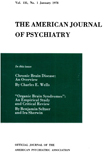A Possible Genetic Factor Related to Psychosis
Abstract
Recent studies of schizophrenia in large twin cohorts have indicated that there is probably a genetically determined biological mechanism that predisposes one to the illness, though environmental factors also play a major pathogenic role. Data from this study of monozygotic twins discordant for schizophrenia suggest that some abnormality of catecholamine metabolism may be related to this genetic predisposition. The urinary excretion levels of most catecholamines were higher than normal in both members of these discordant pairs and showed significant intraclass correlation, which strongly suggests the possibility of genetic control. Levels of 17-OH steroids, however, were higher than normal only in the schizophrenic members of the pairs. Taken together, these findings and other data in the literature suggest that hyperactivity at some level of catecholamine metabolism may play a role in the pathogenesis of both schizophrenic and other psychoses.
Access content
To read the fulltext, please use one of the options below to sign in or purchase access.- Personal login
- Institutional Login
- Sign in via OpenAthens
- Register for access
-
Please login/register if you wish to pair your device and check access availability.
Not a subscriber?
PsychiatryOnline subscription options offer access to the DSM-5 library, books, journals, CME, and patient resources. This all-in-one virtual library provides psychiatrists and mental health professionals with key resources for diagnosis, treatment, research, and professional development.
Need more help? PsychiatryOnline Customer Service may be reached by emailing [email protected] or by calling 800-368-5777 (in the U.S.) or 703-907-7322 (outside the U.S.).



